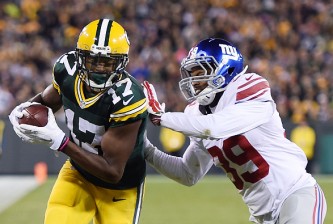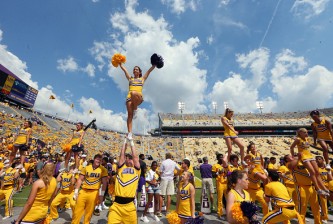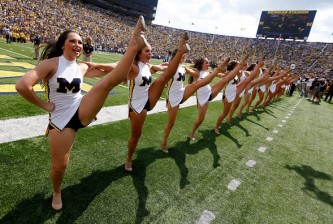This is a review of the HBO documentary on “Magic & Bird: A Courtship of Rivals”.
The documentary shows the impact of Magic Johnson and Larry Bird on college basketball with their historic 1979 National Championship game and then on the NBA throughout the 1980’s into the early 1990’s.
In what is truly a gem, the documentary shows rare footage of Bird and Johnson playing together on a college all-star team in the 1978 World Invitational Tournament for Team USA, throwing no-look passes to each other. While the two hardly spoke to each other, the chemistry between Bird and Magic was apparent. Johnson says about Bird in that tournament, “Oh man. This guy got game.” But as the two left, it was clear they weren’t friends.
The documentary goes into their Midwestern roots, Johnson growing up in Lansing, Michigan, Bird in French Lick, Indiana. Johnson was outgoing and charismatic. Bird was shy and withdrawn. Johnson had his own posse. Bird kept to himself and was alone. But what was clear that both were tremendous basketball players. Johnson attended Michigan State of the Big Ten. After withdrawing from Indiana University, Bird eventually landed at Indiana State.
We see how the two while so different were very similar. Hard work ethics on and off the court. Great basketball knowledge. A sense of when to take over the game. And they also made their teammates better. In 1979, Michigan State and Indiana State were on a collision course for the national title game. The teams met and Michigan State won the game, a defeat that hurts Bird to this day. He says, “I didn’t play well at all. Biggest game of my life, I didn’t play well. I didn’t shoot well. Missed, I think three free throws… I didn’t have it.”
The documentary also stresses the racial divide. Blacks liked Magic. Whites were attracted to Bird. Blacks did not feel a white man could play basketball as well as them and thought that Bird’s game was hype.
As the two men went to the NBA, Johnson went to the Los Angeles Lakers, Bird to the Boston Celtics. Both men fit their locales. Johnson’s was flashy. It fit the run and gun style of the Lakers. And he found that he loved the Hollywood lifestyle. Johnson relished being a celebrity.
Bird fit the lunch pail mentality of New England, a hard working, blue collar guy who dove for loose balls, sacrificed his body and caused fights when necessary. Bird would not seek the spotlight. But when he mowed his lawn, people would gather to watch him.
But as we find out in “Magic & Bird”, the two men drove each other. When Bird won the Rookie of the Year Award, Magic was angry he didn’t win one. When Johnson and the Lakers won the NBA title in 1980, Bird said, “He won the championship and I was pissed. I wanted one.”
Bird was also obsessed. He would check the morning box scores to compare how Johnson did to him. Johnson was the same way. Magic said, “I hated what was said that Larry was better than me and that, you know, I’m just a guy who can control the game…. I didn’t tell nobody that it bothered me, but it did.”
Throughout the 1980’s, the NBA marketed Bird and Magic as its two biggest stars. CBS which had the NBA TV contract took advantage by showing NBA doubleheaders, the first game involving the Celtics and Bird, and the second involving the Lakers and Johnson. They were ratings bonanzas.
It all led to 1984 when the Lakers and Celtics squared off for the NBA Championship. While the Lakers were heavily favored, the Celtics took Los Angeles off its Showtime offense. The Celtics got physical and were mentally tougher. The Celtics and Bird took the Championship in 7 games and Bird could not have been happier. Bird said about Magic, “I hope he was hurtin’. I hope it killed him.”
The loss devastated Johnson. He made it a mission to work harder to win. And in 1985, he managed to reverse the result and the Lakers won the NBA Championship in 6 games.
Up until this time, Magic and Bird were adversaries. They rarely spoke. Both shared an intense dislike for the other. But things changed when they filmed a sneaker commercial at Bird’s home in French Lick. The two started talking and they started getting along. The one item that put things over the top? Larry’s mother fixing lunch for Magic during a break. Magic saw his own mother. Bird jokes, “He (Johnson) charmed her… But that’s Magic. He makes everybody feel welcome and warm and comfortable. He’s a con man (laughter).” Through it all, Bird says, “It was a great day.”
But the ad helped to polarize fans. Whites who loved Larry Bird bought the shoe associated with the Celtics star. Blacks went out and bought Magic’s shoe in droves. Bird was a symbol for Blacks of resentment towards whites. And the media’s perceived love of Bird helped to stoke the flames.
The Lakers and Celtics would meet one more time in 1987 with Los Angeles winning again. For Bird, it would be last time in the Finals. Magic and the Lakers would go on to win one more championship in 1988.
Bird’s health would get worse after that. He spent the last seven seasons of his career battling a bad back. There were flashes of brilliance, but he was never same. Bird felt he should have retired after the 1988 season, but he kept going in hopes of another NBA Finals against Magic, however, it never happened.
For Magic, the turning point was when he was diagnosed HIV-positive in 1991. He had to retire immediately. Bird was devastated. Johnson said, “And I’m choked up because he (Bird) did call me. When something happens to you and then you find out who really your friends are … and people who really just care about you.”
When Magic retired, Bird lost his nemesis, his arch-rival and his friend. “I didn’t check the papers anymore. It didn’t matter …. it wasn’t the same.”
But they did play together once more on the 1992 Olympic Dream Team in Barcelona. It brought them full circle. But while they were on the same team, they were still different. Larry would find a side door to avoid crowds. Magic would bust through them. But the relationship worked that way.
Johnson said about Bird, “He’s very private, but if he’s your friend, you got a friend for life…. He’ll tell you when he doesn’t like you. That’s one thing I wish I could have that he has that I don’t have.”
On Johnson, Larry says, “I mean, if he walked in here, this whole room would change. And maybe that’s what I always wanted to be, but I just couldn’t.”
The documentary is another in a long line of excellent efforts from HBO Sports. From the rare footage of the World Invitational Tournament to Bird talking about one of the more devastating moments in his life, to Magic talking about being HIV-positive, there are full of gems. The documentary doesn’t shy away from talking about the race factor.
In addition to hearing from Johnson and Bird, we hear from former Boston Globe reporter Jackie MacMullan whose book “When the Game Was Ours” was the basis for the documentary, Los Angeles Times reporter Steve Springer, Bird teammates Kevin McHale and Cedric Maxwell, former Lakers coach Pat Reilly, Johnson buddy Arsenio Hall and former Johnson teammate Michael Cooper.
But the best line in the documentary comes from HBO host and former NBC Sports broadcaster Bryant Gumbel and it comes at the end. You’ll have to watch to find out what he says.
A slam dunk for HBO, the overall grade is A+. As someone who lived throughout the Magic-Bird rivalry, the documentary captures the feel of times and brings us back to when the NBA needed a savior and in Bird and Johnson, the league found two.
“Magic & Bird: A Courtship of Rivals” premieres tonight on HBO at 8 with multiple replays during the month.






















